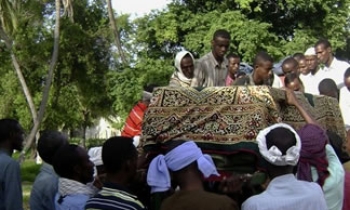Should newspapers, including this one, carry such a caveat? Perhaps this suggestion is not as bizarre as it might first sound. A newspaper, particularly on its front page, daily presents a view of reality.
In fact, this reality is totally relative and highly subjective. Obviously, the front page of a San Francisco newspaper will portray a 'reality' very different from that of a newspaper published in Shanghai.
Even events with global repercussions such as 9/11 or the December 2004 tsunami will get very different treatment in different places. For instance, in India, the casualty figures of Indian citizens involved would take precedence over other nationalities. Death and disaster carry passports.
The selection of news, especially front-page news, is largely determined by the old journalistic axiom: Bad news sells better than good news. For instance, which headline would be seen to be a bigger attention-grabber: "200 killed in plane crash" or "Five new schools opened in Jharkhand"?
But who says that bad news can sell more papers than good news? Do readers say this or do journalists say and believe this because of convention?
In fact, good news can also sell but relying on the tried and tested formula of the five Ds of newspapers Death, Decay, Disease, Disaster and Destruction is much easier than digging up and displaying more positive but less obviously dramatic events.
(Though if you look at it, the long-term implications of five schools being opened in a socially backward area would probably result in a greater multiplier effect than the plane crash.)
In short, newspapers traditionally have been purveyors of what might be called manufactured anxiety, on the assumption that the more anxious you are about something, the more you will want to find out about that which is making you anxious. The daily fix of anxiety can become as addictive as nicotine or caffeine.
One of the main triggers of manufactured anxiety is death. And the more spectacular, the better. Hence the prominence given in headlines to wars, plane crashes, and terror attacks. However, as the accompanying story shows, the average citizen is very unlikely to die of such causes.
The real killers in fact are far more insidious and unspectacular and range from bad cholesterol and diabetes to disease-carrying mosquitoes. A true to reality warning at the edge of the forest should read: 'Don't beware of the lion; the machchar is more likely to get you.'
Does this mean newspapers should trivialise traumatic events? Certainly not. That would be adopting an ostrich-like approach, hiding our heads in the sand. Perhaps there ought to be a perspectives editor who would put the event in proper proportion with similar events in the past or those taking place at the current time.
Having manufactured anxiety, what else does a newspaper do? It seeks to provide remedy or cure for your fears.
For example, if on a given day, an elderly couple is murdered in Delhi's Vasant Kunj and a housewife in the Greater Kailash area is also killed in a violent robbery, these two coincidental deaths (two statistics out of an enormous calculus of that day's mortality from various causes) will typically be construed as 'CITY HIT BY VIOLENT CRIME WAVE'.
Suddenly everyone that you meet is talking about the possibility of being battered to death in your own house by armed intruders though in fact nothing of the sort has happened to you or anyone you indirectly know.
Having created this anxiety over violent crime, the newspaper then goes on to suggest various remedies. Editorials are written about the need for better policing and of creating neighbourhood vigilance groups.
Letters to the editor will be published seeking more stringent punishment for perpetrators of violent crime. The spiritual columns will urge readers to treat all kinds of death as mere illusion.
Different kinds of newspapers produce different grades of anxieties and the remedies to go with them. A 'hawkish' paper might conjure up anxieties about an imminent nuclear exchange between India and Pakistan and suggest 'remedies' as drastic as a pre-emptive action and stepping up the nuclear arms race.
A more 'dove-ish' paper might sideline nukes and concentrate instead on civic issues such as lack of municipal water or the spread of malaria or dengue in the neighbourhood and the domestic problems these are causing. The suggested remedies would then be about setting up rainwater harvesting systems and improving sanitary conditions as a preventive to disease.
So should you not be reading this paper right now? The choice is entirely yours. What is important is that it should be an informed choice, conducive to the least amount of anxiety.









